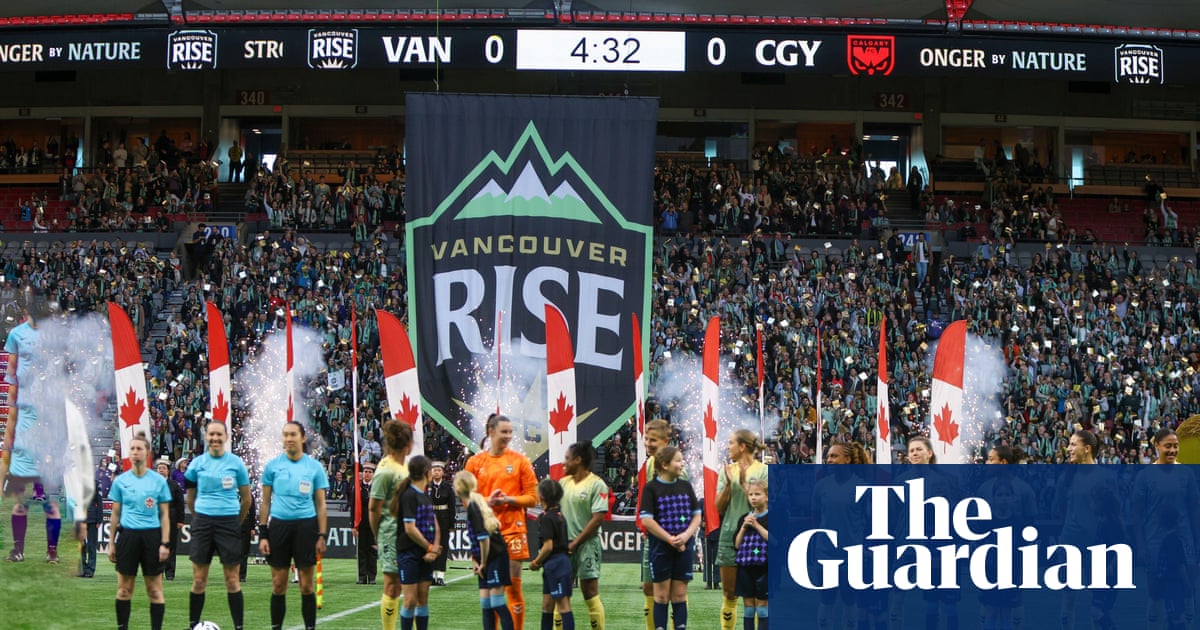As “O Canada” reverberated around Vancouver’s BC Place last Wednesday, the emotion was clear on the faces of those on the pitch and in the crowd. There were hugs, there were tears, and there was an unbeatable cacophony of noise when Quinn slotted home the winning penalty, the first goal of the Northern Super League era. All 14,000 inside the stadium were aware of how momentous this occasion was, the moment professional domestic women’s football had finally arrived in Canada.
For many of the Canadian players involved in Vancouver Rise and Calgary Wild, it was the first time they will have heard only their anthem at the start of the match. “It was something I said to our team before the game,” the Rise midfielder Quinn reflected after the game. “That was pretty neat.”
The Northern Super League has been a long time coming and the excitement in the buildup to the opener was palpable. For a nation that has enjoyed success on the international stage and has the third-largest player pool in the world, the absence of a professional domestic game has been stark. With no pathway to follow in their country, players have had to look overseas – to the USA, Sweden, England and beyond – to make a career out of playing the sport.
The fact that it took a former player to push it through rather than Canada Soccer taking the lead tells a story in and of itself. The NSL is the brainchild of Diana Matheson, who represented Canada on 206 occasions over a 17-year period. Since her retirement in 2021, the former midfielder has set her mind on making her “dream come true”.
Matheson was visibly emotional as she took her seat in front of the media alongside the all-time top international goalscorer, Christine Sinclair, on the eve of kick-off. Sinclair echoed the feelings of her longtime teammate. The 41-year-old hails from Burnaby in British Columbia, played her farewell international game at BC Place and is now a co-owner of Vancouver Rise.
“I’m a little bit more emotional than I thought,” Sinclair admitted. “I was sitting out on the bench in the empty stadium being like: ‘This is actually happening.’ Diana and I grew up with different possibilities to what young Canadians have today.”
“These kids have a different future and it’s because of this woman,” she added, pointing to Matheson. “She does not get the credit that she deserves for literally starting a league from scratch.”
That, however, is exactly what Matheson has done. She established a company, Project 8, to build the NSL to the point where it can launch with six professional franchise teams and multiple sponsorship and broadcast deals. The aim is to provide a platform for Canadian players to flourish while attracting talent from around the world. Vancouver Rise, Calgary Wild, Montréal Roses, AFC Toronto, Halifax Tides and Ottawa Rapid are involved in the inaugural season with the league spreading from coast to coast and there are already plans for expansion. Players are at the heart of the project with a minimum wage of $50,000 CAD (£27,000), maternity cover, accommodation provision, and a $1.6m CAD salary cap on player squads among other things.
By their own admission, those involved do not have all the answers yet and there is an element of trying to build the plane while flying. There is, however, something refreshing about building from a blank slate. While there has been clear progress in England, for example, the women’s game in general must constantly battle for visibility and space in a traditionally male-dominated space. In contrast, the NSL is in a league of its own – it has the power itself to shape how it wants the sport to run and what kind of culture it wants to exist in.
From first viewing, the product on the pitch itself – arguably, the most important part – has plenty of potential. Both Vancouver Rise and Calgary Wild – coached by Denmark’s Anja Heiner-Møller and England’s Lydia Bedford, respectively – clearly wanted to possess the ball from the outset and grew into their style as the game continued. Having been in existence for a mere 10 weeks or so, there is inevitably going to be in a settling in period as player relationships develop and teams learn about their opponents but the signs were positive.
after newsletter promotion
Time will tell how the league will progress. This is very much just the start, but after hearing from so many involved and the ambitions they hold, it is difficult not to believe in the project.
Being inside BC Place last week and witnessing a quintessentially Canadian celebration was a unique experience. It was a full circle moment personally too. Almost a decade ago, I remember being in the stands at BC Place for the famous 2015 World Cup quarter-final between England and the hosts, and waving up to a friend in the press box. This time I was seated in that very press box covering another moment in history; one that might just help change the course of the game in Canada for good.
Get in touch
If you have any questions or comments about any of our newsletters please email [email protected].
-
This is an extract from our free weekly email, Moving the Goalposts. To get the full edition, visit this page and follow the instructions. Moving the Goalposts is back in to its twice-weekly format, delivered to your inboxes every Tuesday and Thursday.
